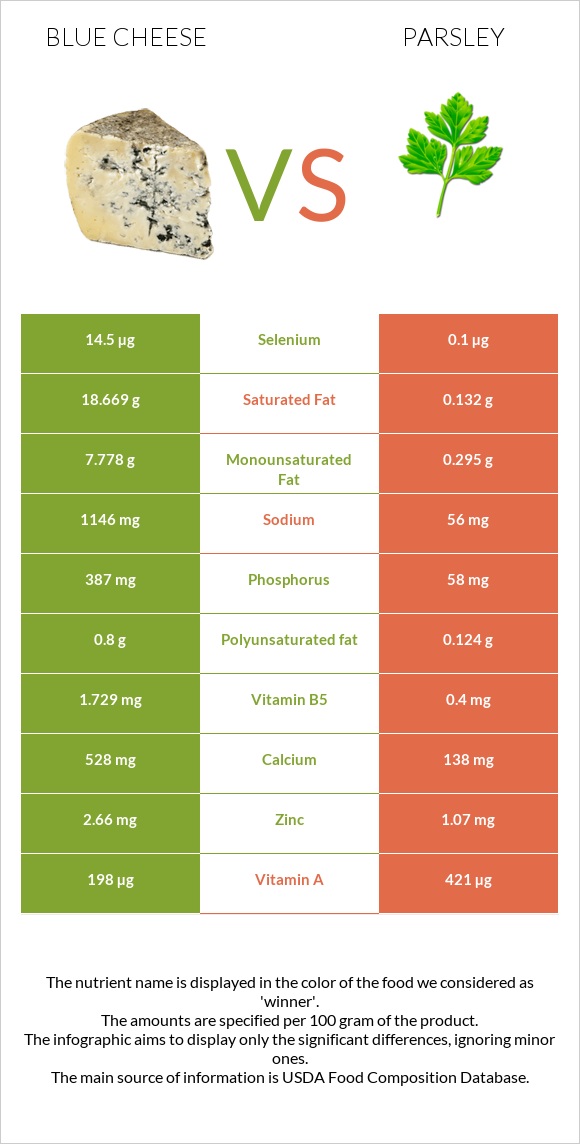Blue cheese vs. Parsley — In-Depth Nutrition Comparison
Compare
Differences between blue cheese and parsley
- Blue cheese has more vitamin B12, phosphorus, and calcium, while parsley has more vitamin K, vitamin A, vitamin C, iron, and folate.
- Parsley's daily need coverage for vitamin K is 1365% higher.
- The amount of saturated fat in parsley is lower.
The food types used in this comparison are Cheese, blue and Parsley, fresh.
Infographic

Infographic link
Mineral Comparison
Mineral comparison score is based on the number of minerals by which one or the other food is richer. The "coverage" charts below show how much of the daily needs can be covered by 300 grams of the food.
| Contains more CalciumCalcium | +282.6% |
| Contains more ZincZinc | +148.6% |
| Contains more PhosphorusPhosphorus | +567.2% |
| Contains more SeleniumSelenium | +14400% |
| Contains more MagnesiumMagnesium | +117.4% |
| Contains more PotassiumPotassium | +116.4% |
| Contains more IronIron | +1900% |
| Contains more CopperCopper | +272.5% |
| Contains less SodiumSodium | -95.1% |
| Contains more ManganeseManganese | +1677.8% |
Vitamin Comparison
Vitamin comparison score is based on the number of vitamins by which one or the other food is richer. The "coverage" charts below show how much of the daily needs can be covered by 300 grams of the food.
| Contains more Vitamin DVitamin D | +∞% |
| Contains more Vitamin B2Vitamin B2 | +289.8% |
| Contains more Vitamin B5Vitamin B5 | +332.3% |
| Contains more Vitamin B6Vitamin B6 | +84.4% |
| Contains more Vitamin B12Vitamin B12 | +∞% |
| Contains more Vitamin CVitamin C | +∞% |
| Contains more Vitamin AVitamin A | +112.6% |
| Contains more Vitamin EVitamin E | +200% |
| Contains more Vitamin B1Vitamin B1 | +196.6% |
| Contains more Vitamin B3Vitamin B3 | +29.2% |
| Contains more Vitamin KVitamin K | +68233.3% |
| Contains more FolateFolate | +322.2% |
All nutrients comparison - raw data values
| Nutrient |  |
 |
DV% diff. |
| Vitamin K | 2.4µg | 1640µg | 1365% |
| Vitamin C | 0mg | 133mg | 148% |
| Saturated fat | 18.669g | 0.132g | 84% |
| Iron | 0.31mg | 6.2mg | 74% |
| Vitamin B12 | 1.22µg | 0µg | 51% |
| Phosphorus | 387mg | 58mg | 47% |
| Sodium | 1146mg | 56mg | 47% |
| Fats | 28.74g | 0.79g | 43% |
| Calcium | 528mg | 138mg | 39% |
| Protein | 21.4g | 2.97g | 37% |
| Folate | 36µg | 152µg | 29% |
| Vitamin B5 | 1.729mg | 0.4mg | 27% |
| Selenium | 14.5µg | 0.1µg | 26% |
| Cholesterol | 75mg | 0mg | 25% |
| Vitamin A | 198µg | 421µg | 25% |
| Vitamin B2 | 0.382mg | 0.098mg | 22% |
| Monounsaturated fat | 7.778g | 0.295g | 19% |
| Calories | 353kcal | 36kcal | 16% |
| Zinc | 2.66mg | 1.07mg | 14% |
| Fiber | 0g | 3.3g | 13% |
| Copper | 0.04mg | 0.149mg | 12% |
| Potassium | 256mg | 554mg | 9% |
| Manganese | 0.009mg | 0.16mg | 7% |
| Magnesium | 23mg | 50mg | 6% |
| Vitamin B6 | 0.166mg | 0.09mg | 6% |
| Vitamin B1 | 0.029mg | 0.086mg | 5% |
| Polyunsaturated fat | 0.8g | 0.124g | 5% |
| Vitamin D | 21 IU | 0 IU | 3% |
| Vitamin E | 0.25mg | 0.75mg | 3% |
| Vitamin D | 0.5µg | 0µg | 3% |
| Vitamin B3 | 1.016mg | 1.313mg | 2% |
| Carbs | 2.34g | 6.33g | 1% |
| Net carbs | 2.34g | 3.03g | N/A |
| Sugar | 0.5g | 0.85g | N/A |
| Choline | 15.4mg | 12.8mg | 0% |
| Tryptophan | 0.312mg | 0.045mg | 0% |
| Threonine | 0.785mg | 0.122mg | 0% |
| Isoleucine | 1.124mg | 0.118mg | 0% |
| Leucine | 1.919mg | 0.204mg | 0% |
| Lysine | 1.852mg | 0.181mg | 0% |
| Methionine | 0.584mg | 0.042mg | 0% |
| Phenylalanine | 1.087mg | 0.145mg | 0% |
| Valine | 1.556mg | 0.172mg | 0% |
| Histidine | 0.758mg | 0.061mg | 0% |
Macronutrient Comparison
Macronutrient breakdown side-by-side comparison
Protein:
21.4 g
Fats:
28.74 g
Carbs:
2.34 g
Water:
42.41 g
Other:
5.11 g
Protein:
2.97 g
Fats:
0.79 g
Carbs:
6.33 g
Water:
87.71 g
Other:
2.2 g
| Contains more ProteinProtein | +620.5% |
| Contains more FatsFats | +3538% |
| Contains more OtherOther | +132.3% |
| Contains more CarbsCarbs | +170.5% |
| Contains more WaterWater | +106.8% |
Fat Type Comparison
Fat type breakdown side-by-side comparison
Saturated fat:
Sat. Fat
18.669 g
Monounsaturated fat:
Mono. Fat
7.778 g
Polyunsaturated fat:
Poly. Fat
0.8 g
Saturated fat:
Sat. Fat
0.132 g
Monounsaturated fat:
Mono. Fat
0.295 g
Polyunsaturated fat:
Poly. Fat
0.124 g
| Contains more Mono. FatMonounsaturated fat | +2536.6% |
| Contains more Poly. FatPolyunsaturated fat | +545.2% |
| Contains less Sat. FatSaturated fat | -99.3% |





